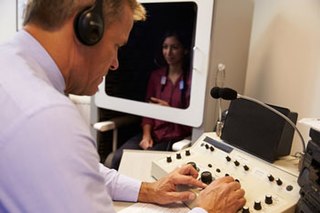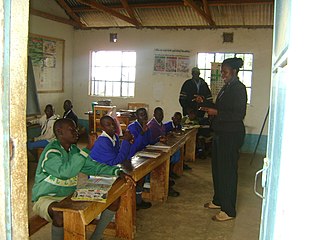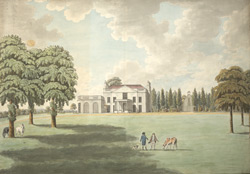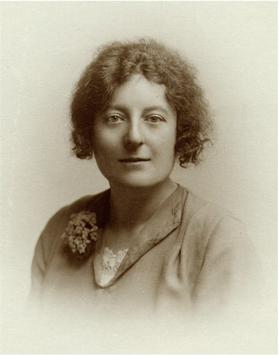This is a glossary of medical terms related to communication disorders which are psychological or medical conditions that could have the potential to affect the ways in which individuals can hear, listen, understand, speak and respond to others.
A communication disorder is any disorder that affects an individual's ability to comprehend, detect, or apply language and speech to engage in dialogue effectively with others. The delays and disorders can range from simple sound substitution to the inability to understand or use one's native language.
Speech disorders or speech impairments are a type of communication disorder in which normal speech is disrupted. This can mean stuttering, lisps, etc. Someone who is unable to speak due to a speech disorder is considered mute. Speech skills are vital to social relationships and learning, and delays or disorders that relate to developing these skills can impact individuals function. For many children and adolescents, this can present as issues with academics. Speech disorders affect roughly 11.5% of the US population, and 5% of the primary school population. Speech is a complex process that requires precise timing, nerve and muscle control, and as a result is susceptible to impairments. A person who has a stroke, an accident or birth defect may have speech and language problems.

A cochlear implant (CI) is a surgically implanted neuroprosthesis that provides a person who has moderate-to-profound sensorineural hearing loss with sound perception. With the help of therapy, cochlear implants may allow for improved speech understanding in both quiet and noisy environments. A CI bypasses acoustic hearing by direct electrical stimulation of the auditory nerve. Through everyday listening and auditory training, cochlear implants allow both children and adults to learn to interpret those signals as speech and sound.

Audiology is a branch of science that studies hearing, balance, and related disorders. Audiologists treat those with hearing loss and proactively prevent related damage. By employing various testing strategies, audiologists aim to determine whether someone has normal sensitivity to sounds. If hearing loss is identified, audiologists determine which portions of hearing are affected, to what degree, and where the lesion causing the hearing loss is found. If an audiologist determines that a hearing loss or vestibular abnormality is present, they will provide recommendations for interventions or rehabilitation.

Speech-language pathology is a healthcare field of expertise practiced globally. Speech-language pathology (SLP) specializes in the evaluation, diagnosis, treatment, and prevention of communication disorders, cognitive-communication disorders, voice disorders, and swallowing disorder across the lifespan. It is an independent profession that is sometimes considered a "related health profession" or allied health profession by professional bodies like the American Speech-Language-Hearing Association (ASHA) and Speech Pathology Australia. Allied health professions include audiology, optometry, occupational therapy, rehabilitation psychology, physical therapy and others.

Developmental coordination disorder (DCD), also known as developmental motor coordination disorder, developmental dyspraxia or simply dyspraxia from the word 'praxis' meaning to do or act, is a neurodevelopmental disorder characterized by impaired coordination of physical movements as a result of brain messages not being accurately transmitted to the body. Deficits in fine or gross motor skills movements interfere with activities of daily living. It is often described as disorder in skill acquisition, where the learning and execution of coordinated motor skills is substantially below that expected given the individual's chronological age. Difficulties may present as clumsiness, slowness and inaccuracy of performance of motor skills. It is also often accompanied by difficulty with organisation and/or problems with attention, working memory and time management.
A speech sound disorder (SSD) is a speech disorder in which some sounds (phonemes) are not produced or used correctly. The term "protracted phonological development" is sometimes preferred when describing children's speech, to emphasize the continuing development while acknowledging the delay.

The Royal National Throat, Nose and Ear Hospital was a health facility on Gray's Inn Road in London. It closed in October 2019 when services transferred to the new Royal National ENT and Eastman Dental Hospitals on Huntley Street, London, WC1E 6DG. The Huntley Street hospital continues to provide specialist ENT, sleeps and allergy services and is part of University College London Hospitals NHS Foundation Trust.
Auditory processing disorder (APD), rarely known as King-Kopetzky syndrome or auditory disability with normal hearing (ADN), is a neurodevelopmental disorder affecting the way the brain processes sounds. Individuals with APD usually have normal structure and function of the outer, middle, and inner ear. However, they cannot process the information they hear in the same way as others do, which leads to difficulties in recognizing and interpreting sounds, especially the sounds composing speech. It is thought that these difficulties arise from dysfunction in the central nervous system. It is highly prevalent in individuals with other neurodevelopmental disorders, such as attention deficit hyperactivity disorder, autism spectrum disorders, dyslexia, and sensory processing disorder.

Deaf education is the education of students with any degree of hearing loss or deafness. This may involve, but does not always, individually-planned, systematically-monitored teaching methods, adaptive materials, accessible settings, and other interventions designed to help students achieve a higher level of self-sufficiency and success in the school and community than they would achieve with a typical classroom education. There are different language modalities used in educational setting where students get varied communication methods. A number of countries focus on training teachers to teach deaf students with a variety of approaches and have organizations to aid deaf students.
The UCL Ear Institute is an academic department of the Faculty of Brain Sciences of University College London (UCL) located in Gray's Inn Road in the Bloomsbury district of Central London, England, next to the Royal National Throat, Nose and Ear Hospital, the UK's largest ear, nose and throat hospital.
Apraxia of speech (AOS), also called verbal apraxia, is a speech sound disorder affecting an individual's ability to translate conscious speech plans into motor plans, which results in limited and difficult speech ability. By the definition of apraxia, AOS affects volitional movement pattern. However, AOS usually also affects automatic speech.
Language-based learning disabilities or LBLD are "heterogeneous" neurological differences that can affect skills such as listening, reasoning, speaking, reading, writing, and math calculations. It is also associated with movement, coordination, and direct attention. LBLD is not usually identified until the child reaches school age. Most people with this disability find it hard to communicate, to express ideas efficiently and what they say may be ambiguous and hard to understand It is a neurological difference. It is often hereditary, and is frequently associated to specific language problems.

Castlebar Hill is a hill in Ealing which is 167 feet (51 m) high. In the 18th century, it was the location of Castle Beare, a grand mansion or country seat, for the area at this time was but a hamlet, not yet having been built up as part of the London conurbation.

Edith Aileen Maude Whetnall, was an ear, nose and throat surgeon. She was known for her work with children who were almost profoundly deaf.

Mary Dorothy Sheridan, OBE, FFCM was an English paediatrician and public health officer who pioneered the study of child development.
Nicola Botting is a language and communication scientist whose work focuses on language and psychological outcomes of children with low birth weight, autism spectrum disorder, developmental language disorder, and other developmental disabilities. She is Professor of Developmental Disorders, Language & Communication Science at the City University of London. Botting is editor-in-chief of the journal Autism & Developmental Language Impairments.
Ciwa Griffiths was an American speech therapist and pioneer of auditory-verbal therapy and universal neonatal hearing screening.
Deaf and hard of hearing individuals with additional disabilities are referred to as "Deaf Plus" or "Deaf+". Deaf children with one or more co-occurring disabilities could also be referred to as hearing loss plus additional disabilities or Deafness and Diversity (D.A.D.). About 40–50% of deaf children experience one or more additional disabilities, with learning disabilities, intellectual disabilities, autism spectrum disorder (ASD), and visual impairments being the four most concomitant disabilities. Approximately 7–8% of deaf children have a learning disability. Deaf plus individuals utilize various language modalities to best fit their communication needs.










